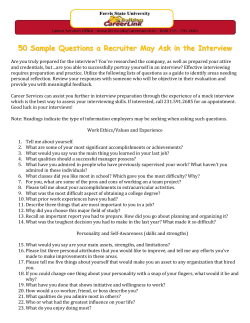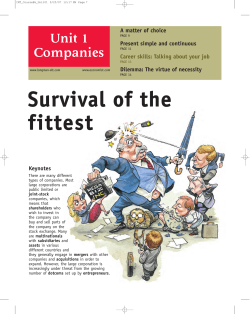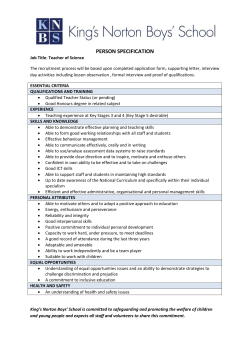
Coursebook - Pearson ELT
Unit01.qxd 8/11/07 12:36 Page 7 Unit 1 Contacts www.longman-elt.com www.economist.com Working in a foreign country PAGE 9 to be; a / an PAGE 11; 12 Career skills: Introducing yourself PAGE 13 Dilemma: Who to interview? PAGE 14 The global business world Keynotes In modern business, company employees often have business contacts in different countries. When we meet someone for the first time, we greet the person. We introduce ourselves by saying our first name and surname. Sometimes we give the person a business card with details about our job title and company. Unit01.qxd 8/11/07 12:36 Page 8 Preview 1 What information is on most business cards? Label the business card with the words in the box. qualifications company name 1 first name 2 address job title first name surname 3 VJB 4 FINANCE (Hons), ACCA Ted Shaw, BA VJB Finance 23 Wood Road Bristol BS5 21AJ United Kingdom 2424823 Telephone: 0384 le.com efi m ho B@ Email: tshaw.VJ Accountant 5 6 2 Read about business cards in different countries. Complete the information with the countries in the box. Switzerland Mexico 3 Titles (for example, Dr, MBA, PhD) are important in . Write professional titles and qualifications on your business card. 4 Speaking Unit 1 the UK the end of a business cards at ge an ch ex en oft People . e UK meeting in th It is a good id and English ea to print business card in s in Spanish 2 . 1 8 China Businesspeople give and receive business car hands in . Read the card imme ds with both diately and then give your card to yo ur business contact. How do people greet business contacts in your country? How do people greet business contacts in other countries around the world? Unit01.qxd 8/11/07 12:36 Page 9 Reading 1 Read the article and find the following. Brazilian 1 Carlos Ghosn’s nationality 2 two companies that he works for 3 a city in Asia 4 three European cities 5 a country in Asia 2 1 2 3 4 5 6 7 8 Read the article again. Are these statements true or false? Carlos Ghosn is the head of BMW. false He travels between Asia, Europe and the USA. Some workers travel to different countries to work on projects. Indian software engineers work on projects in the UK. It’s difficult to travel between European cities. It’s interesting to meet people from different countries. Contacts in different countries are good for business. It isn’t difficult to know what country to pay tax in. The Economist Glossary head (n) the person who manages a company employee (n) a person who works for a company IT (n) Information Technology commute (v) travel to and from work tax (n) the money that a company and employees pay to the government Business and travel Working in a foreign country There is a new type of worker in today’s global business T oday , more and more people travel in their job. Carlos Ghosn is a Brazilian businessman and he travels to different countries for his work. He is the head of the French car company Renault, and he spends 40 per cent of his time in Paris. He is also the head of Nissan, and he spends 35 per cent of his 1 Speaking time in Asia, in Tokyo. He spends 25 per cent of his time in other countries, such as the USA. 2 Some employees travel to different countries to work on projects. They are in a country until a project ends and then they return home. For example, many IT engineers live in India but work on projects in the UK and the USA. Other people live in a country but go to work every day in a different country. In Europe, workers regularly commute between Brussels, London and Paris. Plane tickets are not expensive and travel between the cities is easy with a European passport. 3 But is the increase in business travel a good thing? It is interesting for employees to meet different nationalities. It is also good for business to have contacts in different countries around the world. But there are also problems. Some employees spend a lot of time away from their home country and it is not easy for governments to decide exactly where workers should pay tax. Do you like the idea of working in different countries as part of your job? What countries do you think are interesting to work in? Unit 1 9 Unit01.qxd 8/11/07 12:36 Page 10 Vocabulary 1 Countries and nationalities 1 Complete the table with a country or nationality. 1–5 are from the article on page 9. Use a dictionary to help you with 6–12. Country nationality Country nationality 1 France French Germany 7 Brazil 2 8 Chinese 3 American 9 Polish *4 British Japan 10 5 Indian 11 Russian Spain 6 Kuwait 12 * There are four countries in the UK: England, Scotland, Wales and Northern Ireland. 2 Look at the article again and complete the information about continents. What other continents, and people from them, can you name? Continent A person from this continent 1 Europe 2 Working English We can talk about nationality in different ways. I’m from Britain. I’m British. It’s a British company. I’m from Asia. I’m Asian. It’s an Asian company. 3 1 2 3 4 5 6 Speaking Asian Choose the correct word in italics. We’re Britain / British but we live in China / Chinese. There are a lot of USA / American workers in Hong Kong. I’m from Poland / Polish and I live in Warsaw. Three of our employees are in Spain / Spanish on a project. The head of the company is Russia / Russian. Is this your first visit to Kuwait / Kuwaiti? 1 Talk about the nationalities of these companies. Talk about other companies that you know. Shanghai Tang Michelin Banco de Bilbao Sanyo General Motors Aeroflot Marks & Spencer Shanghai Tang is a Chinese company. 2 Work with a partner. Take turns to ask and answer questions about you and your company or college. Change partners and practise again. Where are you from? I’m from Germany. Where is your university? It’s in Japan. 10 Unit 1 Unit01.qxd 8/11/07 12:36 Page 11 Language check 1 to be Study the examples from the article on page 9 and complete the sentences in the table. a Plane tickets are not expensive. b He is the head of Renault. c It is not easy to decide exactly where workers should pay tax. d Is the increase in business travel a good thing? e They are in a country until a project ends. to be Positive Negative Question Short answer I am (I’m) You are (You’re) He/She/It 1 (He’s/She’s/It’s) We are (We’re) They 2 (They’re) I am not (I’m not) You are not (aren’t) He/She/It 3 (isn’t) Am I? Are you? (aren’t) We 4 They are not (aren’t) Are we? Are they? Yes, I am. / No, I’m not. Yes, you are. / No, you aren’t. Yes, he/she/it is. / No, he/she/it isn’t. Yes, we are. / No, we aren’t. Yes, they are. / No, they aren’t. 5 he/she/it? For more information, see page 158. Practice Listening 1 Complete the sentences with the correct form of to be. Are 1 you a student? 2 Ali a student. He’s an accountant. 3 Leo and Elena from Russia. 4 I Chinese. 5 Mr Amery the head of the company? 6 We from the USA. We’re British. 7 Dominique an engineer. 8 SMGP an Indian bank? 1 John Devlin and Rob Shaw meet at a conference. Complete the conversation with the correct form of to be. Use contractions where possible. John: 1 Are you Rob Shaw? . Rob: Yes, I 2 John Devlin. I’m with Karlsco. John: Hi. I 3 4 Karlsco an American company? Rob: Hi, John. 5 a German company. You 6 with John: No, it Retcorp, aren’t you? .8 you an engineer? Rob: Yes, I 7 9 10 .I a sales manager. John: No, I 2 Listen and check. Practise the conversation with a partner. Unit 1 11 Unit01.qxd 8/11/07 12:36 Page 12 Language check 2 a / an We often use a / an with singular nouns. Study the examples and complete the rules below. a I’m an engineer. c Jules is a sales manager. b It’s an office. d Are you a student? 1 2 We use before words that start with a consonant sound (b, c, d, f, g, h, j, k, l, m, n, p, q, r, s, t, v, w, x, y, z). We use before words that start with a vowel sound (a, e, i, o, u). For more information, see page 158. Vocabulary 2 Jobs 1 Do you use a or an with the jobs in the box? Think of more jobs. Do you use a or an with them? accountant designer architect teacher mechanic salesperson lawyer receptionist 2 Complete the sentences with jobs from the box above. Use a / an where necessary. 1 Laura is a lawyer – she helps people with legal problems. 2 Marco is – he builds offices. 3 Stella is – she’s good with cars. 4 I’m – I work with money. 5 Gregor and Sam are – they give lessons at the college. 6 Philo is – she’s good at art. 7 Ronaldo and I work at Walmart – we’re . 8 Helen is – she welcomes visitors to the company. Listening 2 1 Listen to three conversations. Are these statements true or false? Conversation 1 Conversation 3 1 Petr is an engineer. 5 They’re teachers. 2 Hiroaki is from Saudi Arabia. 6 They’re from Russia. Conversation 2 3 Francesca isn’t Brazilian. 4 She’s an engineer. 2 Correct the false statements. Listen again and check. Speaking 1 Work with a partner. Ask and answer questions about different people. Student A turn to page 137. Student B turn to page 141. What’s his/her name? He/She’s … Is he/she from Japan / Japanese? No, he/she isn’t. Is he/she a lawyer? Yes, he/she is. 2 Make true and false statements about people in your class. Respond to your partner’s statements. Wei is from China. Yes, he is. He’s an engineer. No, he isn’t. He’s an accountant! 12 Unit 1 Unit01.qxd 8/11/07 12:36 Page 13 Career skills Introducing yourself When we meet business contacts for the first time, we usually give information about ourselves, for example, name, nationality, job title and company. We may also need to ask people for information about themselves. Look at the following examples. Match the questions 1–4 with the responses a–d. 1 2 3 4 Listening 3 What’s your name? Where are you from? What do you do? What company are you with? a b c d I’m [an IT manager]. I’m [Tom Allen]. I’m [from the UK] / I’m [British]. I’m [with Alcoa]. 1 Listen to a conversation between Jan and a receptionist. Tick () the questions 1–4 above that the receptionist asks. 2 Listen again and complete the form. Name: Jan 1K Nationality: 2 Company name: 3 3 1 2 3 Listening 4 Industries Complete the phrases 1–3. Match them with the functions a–c. Can you s that, please? a check how to write a word S ? b say information is correct T right. c ask someone to repeat 1 Listen to the conversation. Is this Jan’s first or second meeting with Ben? 2 Listen again and complete the conversation. Jan: Hi. 1 Jan Kowalik. 2 to meet you, Jan. I’m Ben West. Ben: Hello. 3 are you with, Ben? Jan: What ? Ben: I’m with Nerada Electronics. 4 5 Bax Industries. Jan: I’m Ben: Ah. What do you do? . And you? Jan: I’m an IT 6 . Ben: I’m a finance 7 8 company? Jan: Is Nerada a 9 . Ben: No, it isn’t. It’s Speaking Work with a partner. Use the information on the business cards to introduce yourself to your partner and ask questions. Student A turn to page 147. Student B turn to page 149. Unit 1 13 Unit01.qxd 8/11/07 12:36 Page 14 Dilemma: Who to interview? Decision: Brief You work for Business Focus, an international magazine. The magazine has an interview with a different businessperson every month. There are two possible businesspeople to interview for this month’s issue. Your job is to choose the best person. Task 1 Work in two groups. Group A turn to page 137. Group B turn to page 141. Task 2 Work in small groups (some from Group A, some from Group B). Ask and answer questions to complete the information about the businesspeople. Task 3 Look at the information about interviews in the last three issues of Business Focus. Which businessperson from Task 1 is the best person to interview for this month’s issue? Issue 1 Interview with: Bernhard Schmidt Nationality: German Job: sales manager Company: Gerdan (a German company) Useful phrases I think … is the best person to interview. Issues 1, 2 and 3 have interviews with … I like Amita / Philip because … Amita / Philip is interesting because … Issue 2 Interview with: Miles West Nationality: American Job: CEO Company: Artemis (a British company) Write it up Send an email to Frank Black, the editor of Business Focus magazine. Say who you want to interview and give some information about the person’s job and company. Hi Frank I think the best person to interview is … He/She is … 14 Unit 1 Issue 3 Interview with: George Blanc Nationality: French Job: accountant Company: ERT Media (an American company) Listen to Frank Black talking about the person he chooses to interview. Do you agree with his decision?
© Copyright 2025











